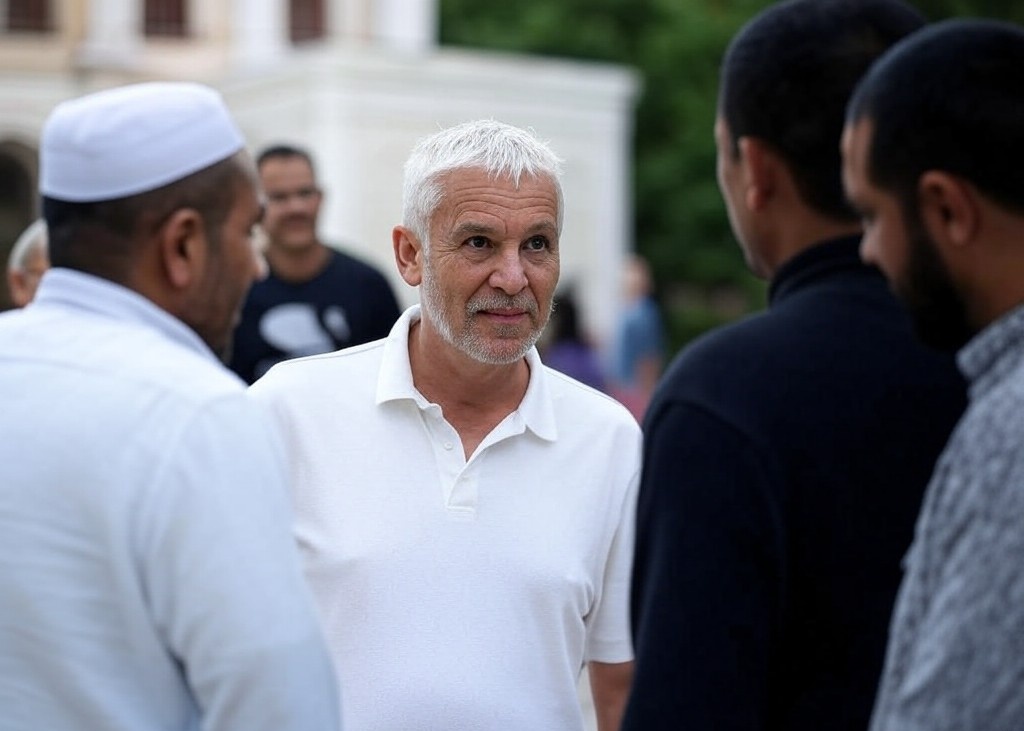A Warm Welcome
If you have recently embraced Islam or are considering taking your shahada (declaration of faith), know that you are embarking on a profound journey of spiritual growth and self-discovery. This guide will help you navigate your first steps with confidence and peace of mind.
Understanding Your Journey
Becoming Muslim marks the beginning of a transformative path. The Prophet Muhammad (peace be upon him) taught us that every person is born in a natural state of submission to Allah (fitrah), so embracing Islam can feel like coming home.
As you begin this journey, remember that Allah says in the Quran: “Indeed, Allah loves those who constantly turn to Him” (2:222)
First Priority: The Declaration of Faith
Your journey formally begins with the shahada: “Ash-hadu an la ilaha illa Allah, wa ash-hadu anna Muhammadan rasul Allah” (I bear witness that there is no deity worthy of worship except Allah, and I bear witness that Muhammad is the messenger of Allah).
This profound declaration carries deep meaning. The first part establishes your relationship with the Divine – recognizing Allah as the only One worthy of worship. The second part acknowledges Prophet Muhammad as your guide to understanding and implementing Allah’s guidance in your life.
Building Your Prayer Practice
Prayer (salah) will become the cornerstone of your daily spiritual routine. The Prophet Muhammad said: “The first matter that the slave will be brought to account for on the Day of Judgment is the prayer” (Sunan al-Nasa’i 465).
Start by learning the essential elements:
- The times of the five daily prayers
- How to perform ritual purification (wudu)
- The basic movements and recitations of prayer
Don’t feel overwhelmed – it’s perfectly normal to learn gradually. Many new Muslims begin by praying what they can, even if it’s just the basic movements, while learning the Arabic recitations over time.
Personal Hygiene and Purity
Islam places great emphasis on physical and spiritual cleanliness. Begin incorporating these practices:
- Regular ritual washing (wudu) before prayer
- Taking a full shower (ghusl) when required
- Using water for personal cleansing
- Maintaining general cleanliness in your daily life
Developing Your Knowledge
The Prophet Muhammad taught us: “Seeking knowledge is obligatory upon every Muslim” (Ibn Majah 224). Focus your initial learning on:
Understanding the Quran:
Start with a reliable translation in your language. Begin with shorter chapters (surahs) from the back of the Quran, which often contain fundamental beliefs and practices.
Learning About the Prophet:
Study the life and character of Prophet Muhammad through authentic sources. His biography (seerah) provides practical examples of implementing Islamic teachings in daily life.
Managing Relationships
Your conversion to Islam might affect your relationships with family and friends. The Quran guides us to maintain good relations while staying firm in our faith: “And We have enjoined upon man goodness to parents” (29:8).
Remember these principles:
- Show increased kindness to family members, especially if they’re not Muslim
- Maintain appropriate boundaries while keeping ties of kinship
- Find a balance between your new faith and existing relationships
- Seek support from your local Muslim community
Practical Changes
Take gradual steps in implementing Islamic practices:
Dietary Changes:
- Begin avoiding pork and alcohol
- Learn about halal food options in your area
- Start saying “Bismillah” (In the name of Allah) before eating
Dress Code:
- Adopt modest clothing gradually
- Learn about Islamic guidelines for dress
- Make changes at a comfortable pace
Finding Support
Connect with these valuable resources:
- Your local mosque or Islamic center
- Muslim conversion support groups
- Online learning platforms
- Islamic social services
Remember
The Prophet Muhammad said: “Religion is easy, and no one overburdens himself in his religion but he will be unable to continue in that way” (Sahih al-Bukhari 39).
Take things step by step. Focus on building a strong foundation in the basics before moving to more advanced aspects. Allah knows your sincere intentions and efforts.
Your Next Steps
- Connect with your local mosque or Islamic center
- Establish a daily routine for learning
- Begin implementing basic practices gradually
- Build relationships within the Muslim community







